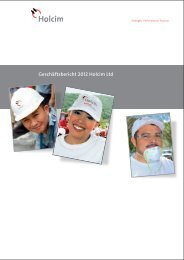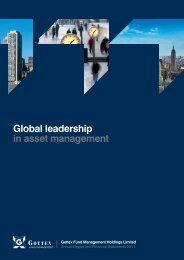Transocean Proxy Statement and 2010 Annual Report
Transocean Proxy Statement and 2010 Annual Report
Transocean Proxy Statement and 2010 Annual Report
Create successful ePaper yourself
Turn your PDF publications into a flip-book with our unique Google optimized e-Paper software.
Other risks<br />
We have significant carrying amounts of goodwill <strong>and</strong> long-lived assets that are subject to impairment testing.<br />
At December 31, <strong>2010</strong>, the carrying amount of our property <strong>and</strong> equipment was $21.5 billion, representing 58 percent of our total<br />
assets, <strong>and</strong> the carrying amount of our goodwill was $8.1 billion, representing 22 percent of our total assets. In accordance with our critical<br />
accounting policies, we review our property <strong>and</strong> equipment for impairment when events or changes in circumstances indicate that carrying<br />
amounts of our assets held <strong>and</strong> used may not be recoverable, <strong>and</strong> we conduct impairment testing for our goodwill when events <strong>and</strong><br />
circumstances indicate that the fair value of a reporting unit may have fallen below its carrying amount.<br />
In the fourth quarter of <strong>2010</strong>, we recognized a loss of $1.0 billion on the impairment of our St<strong>and</strong>ard Jackup asset group due to<br />
projected declines in dayrates <strong>and</strong> utilization, <strong>and</strong> we have previously recognized losses on impairment of goodwill <strong>and</strong> other intangible<br />
assets. Continued or future expectations of low dayrates <strong>and</strong> utilization could result in the recognition of additional losses on impairment of<br />
our long-lived asset groups or our goodwill or other intangible assets if future cash flow expectations, based upon information available to<br />
management at the time of measurement, indicate that the carrying amount of our asset groups, goodwill or other intangible assets may be<br />
impaired.<br />
A change in tax laws, treaties or regulations, or their interpretation, of any country in which we have operations, are<br />
incorporated or are resident could result in a higher tax rate on our worldwide earnings, which could result in a significant<br />
negative impact on our earnings <strong>and</strong> cash flows from operations.<br />
We operate worldwide through our various subsidiaries. Consequently, we are subject to changes in applicable tax laws, treaties<br />
or regulations in the jurisdictions in which we operate, which could include laws or policies directed toward companies organized in<br />
jurisdictions with low tax rates. A material change in the tax laws or policies, or their interpretation, of any country in which we have<br />
significant operations, or in which we are incorporated or resident, could result in a higher effective tax rate on our worldwide earnings <strong>and</strong><br />
such change could be significant to our financial results.<br />
Tax legislative proposals intending to eliminate some perceived tax advantages of companies that have legal domiciles outside<br />
the U.S., but have certain U.S. connections, have repeatedly been introduced in the U.S. Congress. Recent examples include, but are not<br />
limited to, legislative proposals that would broaden the circumstances in which a non-U.S. company would be considered a U.S. resident<br />
<strong>and</strong> proposals that could override certain tax treaties <strong>and</strong> limit treaty benefits on certain payments by U.S. subsidiaries to non-U.S.<br />
affiliates. Additionally, Congressional committees have made inquiries into our tax practices in the past. Any material change in tax laws<br />
or policies, or their interpretation, resulting from such legislative proposals or inquiries could result in a higher effective tax rate on our<br />
worldwide earnings <strong>and</strong> such change could have a material effect on our results of operations.<br />
A loss of a major tax dispute or a successful tax challenge to our operating structure, intercompany pricing policies or<br />
the taxable presence of our key subsidiaries in certain countries could result in a higher tax rate on our worldwide earnings,<br />
which could result in a significant negative impact on our earnings <strong>and</strong> cash flows from operations.<br />
We are a Swiss corporation that operates through our various subsidiaries in a number of countries throughout the world.<br />
Consequently, we are subject to tax laws, treaties <strong>and</strong> regulations in <strong>and</strong> between the countries in which we operate. Our income taxes<br />
are based upon the applicable tax laws <strong>and</strong> tax rates in effect in the countries in which we operate <strong>and</strong> earn income as well as upon our<br />
operating structures in these countries.<br />
Our income tax returns are subject to review <strong>and</strong> examination. We do not recognize the benefit of income tax positions we<br />
believe are more likely than not to be disallowed upon challenge by a tax authority. If any tax authority successfully challenges our<br />
operational structure, intercompany pricing policies or the taxable presence of our key subsidiaries in certain countries; or if the terms of<br />
certain income tax treaties are interpreted in a manner that is adverse to our structure; or if we lose a material tax dispute in any country,<br />
particularly in the U.S., Norway or Brazil, our effective tax rate on our worldwide earnings could increase substantially <strong>and</strong> our earnings<br />
<strong>and</strong> cash flows from operations could be materially adversely affected. For example, there is considerable uncertainty as to the activities<br />
that constitute being engaged in a trade or business within the U.S. (or maintaining a permanent establishment under an applicable treaty),<br />
so we cannot be certain that the Internal Revenue Service (“IRS”) will not contend successfully that we or any of our key subsidiaries were<br />
or are engaged in a trade or business in the U.S. (or, when applicable, maintained or maintains a permanent establishment in the U.S.). If<br />
we or any of our key subsidiaries were considered to have been engaged in a trade or business in the U.S. (when applicable, through a<br />
permanent establishment), we could be subject to U.S. corporate income <strong>and</strong> additional branch profits taxes on the portion of our earnings<br />
effectively connected to such U.S. business during the period in which this was considered to have occurred, in which case our effective<br />
tax rate on worldwide earnings for that period could increase substantially, <strong>and</strong> our earnings <strong>and</strong> cash flows from operations for that period<br />
could be adversely affected.<br />
U.S. tax authorities could treat us as a "passive foreign investment company," which could have adverse U.S. federal<br />
income tax consequences to U.S. holders.<br />
A foreign corporation will be treated as a "passive foreign investment company," or PFIC, for U.S. federal income tax purposes if<br />
either (1) at least 75 percent of its gross income for any taxable year consists of certain types of "passive income" or (2) at least 50 percent<br />
of the average value of the corporation's assets produce or are held for the production of those types of "passive income." For purposes of<br />
AR-22

















